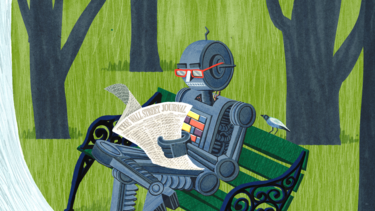Data and AI
The Top Ten AI Competitors
The mammoth investments pouring into artificial intelligence companies are remaking the high-tech industry. Former SOM Dean Ted Snyder and investor Logan Bender ’19 assess which leading companies are likely to keep their advantage and which could be crushed by the rolling wave of innovation.

Data from Twitter Can Predict a Crypto Coin’s Ascent
Cryptocurrencies are notoriously volatile. But listening carefully to social media chatter can help identify winning short-term investments in crypto, according to a study from Yale SOM’s Tauhid Zaman and Khizar Qureshi.

Can AI Help Design a More Appealing Car?
Designing a new car is expensive, time-consuming, and risky. In a new study, Yale SOM’s Alex Burnap shows how machine learning can identify promising models and help designers generate new designs.

Putting AI on Every Team
Is artificial intelligence ready to become a standard business tool? McKinsey’s Bryce Hall ’12 says that combining human expertise and judgment with AI’s data-driven recommendations is a challenging but powerful way to deliver business results.

Can AI Make Economic Predictions by Reading the Newspaper?
In a new study, a team led by Yale SOM researchers devised a way to distill the text of the Wall Street Journal into numerical indicators, which could help policymakers predict how the business cycle will unfold over the coming months and years.

Is Elon Musk Right about the Bot Problem on Twitter?
Elon Musk’s attempt to buy Twitter has turned into a battle over the prevalence of bot accounts on the platform. We asked Prof. Tauhid Zaman, who has studied the impact of bots, how much they skew the experience of Twitter users.

Study: An Abundance of Media Fuels Polarization
Yale SOM’s Vahideh Manshadi and her co-authors built a model showing that faced with a flood of information, an individual tends to take in material that reinforces their existing beliefs.

To Shift Opinions in Online Conversations, Start by Building Trust
New research from Yale SOM’s Tauhid Zaman suggests that starting by establishing common ground makes it possible to make connections and even change some minds.

Now It’s Personal: How Knowing an Ad Is Targeted Changes Its Impact
A consumer’s knowledge that an advertisement has been tailored to their interests changes how they respond, according to a new study co-authored by Yale SOM’s Jiwoong Shin. Firms evaluating marketing strategies should factor consumers’ inferences about targeted ads into their advertising decisions, Shin says.

The American Jewish Community Will Look Different in 50 Years
A new study by Yale SOM’s Edieal Pinker finds that in the coming decades, the more liberal Reform and Conservative denominations will shrink and the number of Jews identifying as Orthodox will grow.

Create Trust Online by Pairing User Control and Data Security
In a new study, Yale SOM’s K. Sudhir and his co-author examine the impact of the EU’s General Data Protection Regulation (GDPR). They find that strict privacy rights paired with strong data security mandates create an atmosphere of trust that makes data sharing more beneficial for both firms and their customers.
